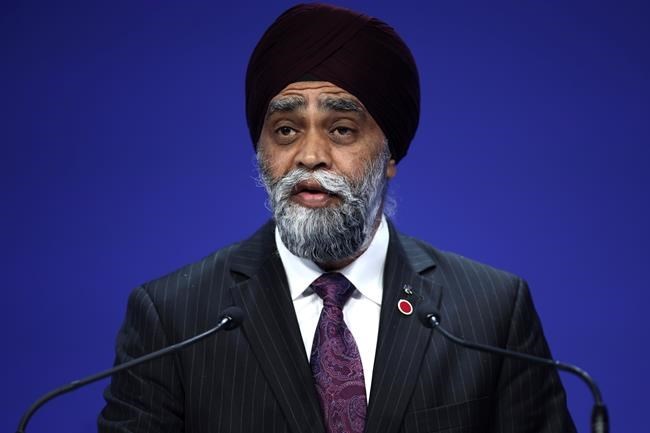
Canada is being hailed for funding initiatives in developing countries that aim to keep women who care for children or elders from being excluded from the economy. Canada's Minister of International Development Harjit Sajjan speaks at the Ukraine Recovery Conference in London, Wednesday, June 21, 2023. THE CANADIAN PRESS/AP-POOL, Henry Nicholls
Republished July 24, 2023 - 11:45 AM
Original Publication Date July 24, 2023 - 8:41 AM
OTTAWA - Foreign-aid groups are praising Ottawa for funding initiatives in developing countries that aim to keep women who care for children or elders from being excluded from the economy.
"Canada actually showed up really strongly," said Katharine Im-Jenkins, managing director of the Equality Fund, in a recent interviewfrom Kigali.
"It's a very challenging moment for global development, and for gender equality and women's rights."
She was speaking from Rwanda's capital on the sidelines of the Women Deliver conference, a major foreign-aid gathering focused on women's advancement.
The conference takes place every few years, with the last hosted in Vancouver in 2019.
At last week's Kigali conference, International Development Minister Harjit Sajjan announced projects to support people working in the paid caring economy and unpaid care roles, with the world set to have much larger proportions of older people and babies in coming years.
For example, an Oxfam Canada project is advocating for change in developing countries to lower the burden on women tasked with unpaid care, such as policies that encourage men to get more involved, providing care for children and elders, and state help for purchasing time-saving devices such as dishwashers and washing machines.
Sajjan also offered details about how $200 million in previously announced funding would be allocated for sexual health and reproductive rights.
Im-Jenkins, whose organization helps administer government cash for projects in developing countries, said Canada is staying the course as other countries pull funding away from sexual-health education, contraception and family planning.
"The halls of the conference were like buzzing … to see Canada hold the line, follow through, follow up, focus, stay the course, and continue the momentum," she said.
"It really matters when Canada does that, because not a lot of other funders are ready to do that."
The announcements come after Canada joined some of its western peers in cutting back on foreign aid, with this year's federal budget showing a 15 per cent drop in funding.
"The global picture, I would characterize it as fragile with climate, conflict and COVID-19 still really affecting a lot of the Global South. And Global North countries are not as ready or as equipped to support them as they have been in the past."
The conference was also beset by an address from an anti-abortion politician, sparking criticism from feminist groups as well as the organizers themselves.
Hungarian President Katalin Novák, who acts as a figurehead for that country's government, has previously argued Hungarian women shouldn’t expect the same salaries or careers as men, and she told the Kigali conference that her country is focusing on increasing its fertility rate. Conference organizers say Novák was invited by the Rwandan government.
Also at the summit, Sajjan, Gender Equality Minister Marci Ien and Liberal MP Arielle Kayabaga met with Rwandan President Paul Kagame, posting photos of themselves smiling and shaking his hand.
The images attracted criticism, as Freedom House says Kagame is an autocrat responsible for "surveillance, intimidation, torture and renditions or suspected assassinations of exiled dissidents," none of which was mentioned in Ottawa's social media or press releases.
Global Affairs Canada has now responded to that criticism, writing in a statement that human rights are "at the forefront" of Canada’s foreign policy.
"Rwanda has accomplished progress in recent decades, especially with respect to national reconciliation and social and economic development," wrote spokesman James Emmanuel Wanki.
"Canada maintains a constructive dialogue and frank exchange of views with the Government of Rwanda on a broad range of issues, including climate, gender equality, regional security and human rights."
This report by The Canadian Press was first published July 24, 2023.
News from © The Canadian Press, 2023